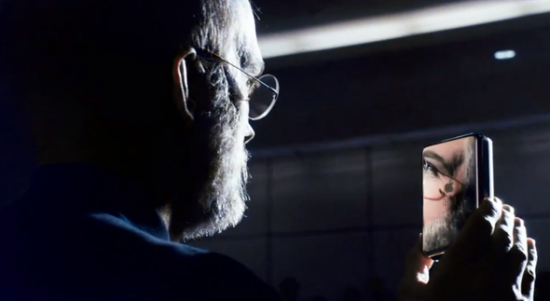Why they didn’t go with the title jObs is anyone’s guess.
At the end of the film, we see a comparison between the actors and the people they played, none of whom are credited. And despite spending two hours with these fellows, there aren’t many you could name. Cliched as it is to say, but that’s a metaphor for the entire film — it’s so concerned with covering all the major events in the history of Apple Computers and simply the looks of its founders and key people that it misses the mark giving the viewer a sense of what made founder Steve Jobs tick.
Granted, the movie opens with a fantastic scene of Steve Jobs (Ashton Kutcher) announcing the iPod. Kutcher’s inflection, body language, and script are dead-on as he builds the audience’s anticipation, teasing them with hints and pauses and mere suggestions — there’s a mix of delight and arrogance that’s electric. Even if you’ve never heard Jobs speak, the performance still conveys the feeling of being in the presence of a great man at the peak of his strengths
It’s too bad the film likewise peaks in this scene. We flash back to Jobs’ college years where we’re told he’s a renegade, a rebel, the guy who doesn’t wear shoes and drops acid and casually mentions to a fling that he has a girlfriend He takes a hit in a field with his girlfriend (Amanda Crew) and after copious amounts of dancing, he lies back, restless. His girlfriend queries, “You’re thinking about your parents, aren’t you?” a tear rolls down Steve’s cheek, and the audience laughs.
Not that it matters, since that’s as far as the discussion goes for the entire film. Similarly, the subplot regarding the daughter he refuses to acknowledge is played out through three scenes, the last of which resolves itself. Did it have a profound impact on Jobs? If it did, we’re not privy to it.
The rest of the time is breezing through, as I mentioned, the milestones of Apple computer: Teaming up with buddy Steve Wozniak (Josh Gad); starting the company out of his parents’ garage; selling the first batch of units; being approached by investor Mike Markkula (Dermot Mulroney); Apple’s rise to major player in personal computing; and the unending conflict between Jobs and the board, represented here in all its evils by Arthur Rock (J.K. Simmons).
All these are excellent fodder for stories, but Matt Whiteley’s screenplay is simply addressing instead of exploring. When Jobs takes his first order we see him negotiating with the buyer, a computer salesman. The buyer offers $400 per unit. Jobs demands $450. The buyer accepts. Then Jobs demands $500. The buyer, again, accepts. Then when Jobs delivers the boards, the buyer is angry that they don’t come with monitors and keyboards. Jobs tells him to sell those separately. The buyer…accepts.
There’s no tension to the scene, no negotiation at all — it’s basically, “Give me this.” “Okay.” “Now give me this.” “Sure.” “And do this for me.” “Well, Steve, you drive a hard bargain, but time’s a-wastin’ so, okay!” If it’s important enough an event to include, it deserves more attention than a quick acknowledgment of “Yeah, and then this happened.” It’s the details that tell the story, but the script of Jobs is ever racing toward the finish, without any sense of love or care for the tale its spinning.
It continues to Jobs’ conflict with Apple’s investors, and at this point, you could devise a drinking game wherein you take a sip every time someone says, “Steve, you’re an innovator, a creative guy, a rebel, a dreamer. The board isn’t going to stand for this!” You’ll be dead in ten minutes (four if you take an extra sip every time Kutcher’s accent slips in and out) and, even in that state, able to offer more interesting dialogue than what these characters are given.
In the end, it’s too bad. Steve Jobs is one of the most interesting people of both this century and that proceeding, and history, if it knows what it’s doing, will remember him for a long time. But for a biopic that purports to celebrate the life of an infinitely creative and daring man, it does a disrespect by taking so few chances; never straying beyond the standard biopic tropes. Either focus on one specific event or turn it into a miniseries.


decrease myweight nowreviews of decrease weight now does decrease weight now work does decrease weight now work? real review of decrease weight now real reviews of decrease weight now forum review decrease weight now forum review of decrease weight now de
August 16, 2013 at 7:30 pmDo you have a spam issue on this website; I also am a blogger,
and I was wanting to know your situation; we have developed some nice procedures
and we are looking to trade methods with other folks, why not shoot me an email if interested.